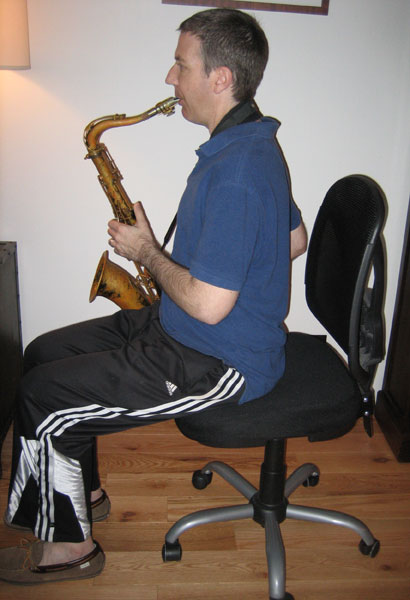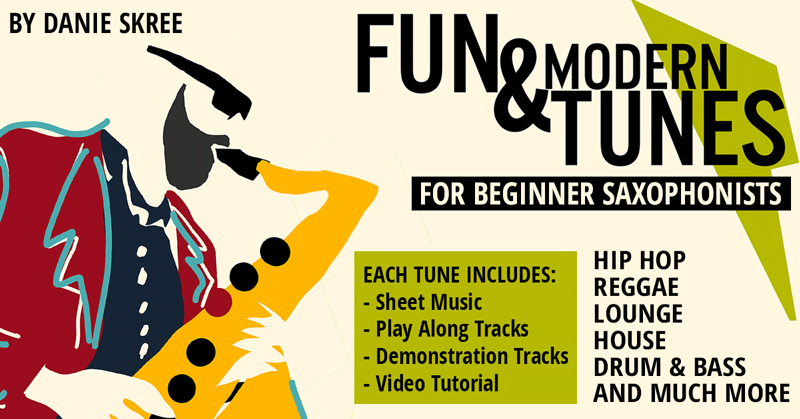9 Tips Guaranteed to Make You Play Better by Relaxing More

Today’s article was inspired by a reader who posed the following great question:
Any tips / advice on the critical skill of learning to relax when playing? Before I start a piece I try to breath deeply and let go of stress in the body. Despite this I can feel the tension rise, particularly in the stomach area.
– Mike
Making difficult things look easy is a hallmark of just about anyone who’s good at something. Does Kobe Bryant look like he’s struggling painfully while making a lay up? Does Meryl Streep come across as forced and unnatural when she graces the screen? Similarly, does Charlie Parker look like he’s falling all over himself when blazing through chorus after chorus of Cherokee?
Even though my knowledge of basketball is more or less nil, I would say that the answer to all three of my questions is “do I even need to dignify that with a response?!” Of course, the three folks I mentioned are just a few examples of people who have thoroughly mastered their craft and have transcended the need to exert any effort beyond what’s absolutely necessary while doing their thing.
Here’s the good news – there are things you can do to today to get you more relaxed on your instrument, which, in turn, is guaranteed to get you playing better almost instantly. Here are nine tips that have helped me tremendously:
1) Eliminate Tension from the Top
It’s a little-known fact that tension in the fingers, hands, arms, and shoulders often originates from tension in the neck . Alexander Technique teacher and Bulletproof Saxophone Playing contributor, Bill Plake encourages us to let our necks be free so that our head can return to its natural balance point.
He describes that the return to balance I’m referring to as follows: “The head is neither pulled downward, thrusted forward, pulled up high and rigid, etc. This natural balance is something we learn as infants and all we are interested in is to not interfere with it as we carry out our activities.”
2) Don’t Try to Sit or Stand Up Too Straight
OK, last time I rip off Bill Plake (in this article), but another great tip he shares is that, for many of us, when we think of sitting or standing up straight, we immediately begin to tense the entire body, which in turn hampers our playing efforts. As mentioned in #1, make sure that your head is resting naturally on your neck. Aim to rest your head above the pelvis, but don’t stiffen yourself to the point where you’re introducing unnecessary tension.

3) Keep Your Embouchure Loose
Did you know that you don’t need to bite down on the mouthpiece with your upper teeth? According to saxophone master, David Liebman, we can practice playing with only the upper lip touching the top of the mouthpiece, creating what’s known as the “double embouchure.” Of course, most of us won’t want to play that way all the time, but the point is to illustrate that no pressure from the upper teeth is required.
The lower lip should be relaxed as well, with the fleshiest part of the lower lip touching the reed. This allows for maximum vibration.
Rather than pinching and dropping the jaw, we should be moving around the horn using what Joe Allard refers to as the “inner embouchure”. You can develop this inner embouchure using exercises such as overtones and playing on the mouthpiece alone.
4) Use the Same Embouchure for Playing that You Use for Speaking
A simpler way to think of embouchure involves what Jerry Bergonzi calls “The No Embouchure Embouchure.” What this means is that when playing, our lips are situated the same way that they’re situated when we’re speaking, or really, the same way that they’re situated any time they’re away from the horn. To practice this approach, simply get in font of a mirror, notice the way your lips look as you simply stand there, and then try and maintain that same naturalness as you place the horn in your mouth.
5) Listen to the Entire Musical Picture and Not Just Yourself
This tip mostly applies to playing in a group, but it can also apply when simply playing along with a metronome. Sometimes we can become so engrossed in what’s coming out of our horn that we lose sight of the goal of music making. When we hone in on only ourselves, our playing becomes less intuitive and more of an intellectual exercise. Since the brain often can’t keep up with the flow of the music, we can clumsily fall behind while our conscious thinking tries to steer the ship . Unfortunately, our conscious thinking can only drive so fast.
I’ve heard Pat Metheny say that while playing, he likes to focus his attention on a random inanimate object such as the carpet under the drum set. I like to focus my attention on the combined sound of all of the musicians, or the sound of the accompaniment. Then I hear myself as a part of the whole and simply adding some flavor to a bigger sonic landscape. Sounds heavy, right? Well, let me tell you, this is the most enjoyable and effective way I’ve found to play along with other musicians and recordings.
6) Focus on Relaxation While Playing
Next time you practice, try going through a part of your practice session not thinking about what your playing, but instead, focusing on how you feel while you’re playing. Try going through your scales not thinking about the notes you’re playing, but scan through your body and also your mind for any sense of tension. If your body or your mind are tight or contorted in any way, let that tension go and watch how things start to improve immediately.
7) Devise a Pre-Playing Ritual
There are things you can do to put yourself in a state of relaxation before picking up the horn. How about listening to a favorite recording? You could read an inspiring quote or maybe a passage from an inspirational book. How about sitting in silence and focusing on your breath for five minutes? If you’re in a group situation, have some light-hearted and maybe even goofy conversation with your bandmates. The point is, find something that relaxes you while you’re away from the horn, and insert that into the beginning of your playing session whenever possible.
8) Start Your Playing Session with Something Fun
Rather than diving right in with long tones or scales, make the first thing you play something fun. In fact, sax giant Bob Sheppard like to start his practice sessions out by playing a tune rather than going into the usual musical calisthenics. Immerse yourself in the spirit of music from note #1, and you’ll be more relaxed for it.
9) Forget About “Sounding Good”
At last year’s NAMM show, I went around to the various saxophone manufacturers’ booths with my mouthpiece and tried out their horns. Since there were a ton of famous saxophonists hanging out at many of these booths, the old me would have been extremely self-conscious while trying out the horns, trying to impress the heavies with my playing, and in the process missing out on the fun of messing with the latest and greatest horns.
However, at this point of my musical development, I don’t identify my self-worth with my current level of musical ability. That being the case, I got to have a blast playing my heart out on these instruments, not putting my focus on what the heavies around me were thinking.
Moral of the story – whether you’re a hobbyist or a pro, do your best, have fun, and then let go of the results. Believe me, even if your fellow musicians as well as audience members disapprove of your playing, they’re probably going to once again be thinking about their own lives within minutes of your last note.
Conclusion
Just about all great music originates from musicians who have a very cozy relationship to their instrument. And you can’t get cozy with anything, or anyone, for that matter, if you’re fighting them.
Just like a relationship with another human being, comfort comes with much experience and patience. Generally speaking, getting chummy with your instrument and with music in general involves lots of experience and patience. But by learning to eliminate as much tension as possible while playing, you’ll find that you and music will make great friends, and that this close friendship will probably come much quicker than you imagined.






January 18, 2013 @ 8:45 am
Great Stuff as usual Doron. I really notice the need to stop myself and relax especially when playing things that are fast or beyond my technique. For me one of the best things that has helped me relax is improving my Technique. I notice now the better I learn my horn, the more relaxed I become because those difficult passages or fast groups of notes just got easier.
January 18, 2013 @ 8:55 pm
Thanks Teddy! Funny thing is that the more you can relax, the better your technique, and the better your technique, the more you can relax – which makes for a beautiful cycle!